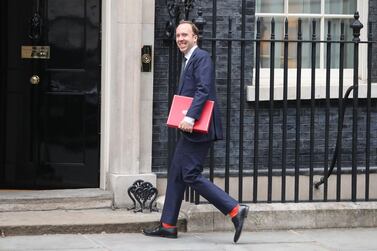One of the largest US healthcare companies is investing millions into Babylon Healthcare, a British technology start-up behind a new chatbot doctor being used by the UK's National Health Service.
Centene Corporation in Missouri is taking a $50 million (Dh183.6m) stake in Babylon, the creator of the GP At Hand service, Sky News reported.
The service, which was publicly endorsed by British Health Secretary Matt Hancock last year, is designed to reduce the burden on doctors and patients who are facing long waits before getting an appointment.
Centene is listed in New York and recorded $60.12 billion in revenue last year.
Information circulated to Babylon's investors this week said the round, which is being led by Saudi Arabia's Public Investment Fund, will value the company at $1.5bn before the new funding.
The Financial Times revealed last week that PIF was investing in Babylon.
The Saudi sovereign fund is investing $200m, with Centene contributing $50m and Munich Re, the German reinsurer, becoming a third new shareholder with $7m.
PIF is able to veto other potential shareholders from the Mena region, in case there is geopolitical tension between them.
Existing investors are providing $129m, with room for another $102m to be invested as part of the Series C round.
Babylon, which was founded in 2013 by entrepreneur Ali Parsa, has become one of market leaders in Britain’s growing healthcare technology sector.
But the company has attracted controversy because of allegations that it could misdiagnose critical illnesses.
Healthcare industry professionals and activists regard the US health giant’s investment in Babylon as controversial, because it could stoke fears that the NHS, a free public service, is being privatised.
Others believe that US investments in public UK services could become more common after Brexit, as Britain looks to appease America and forge a trade deal.
US President Donald Trump has said that the NHS “would be on the table” during trade negotiations.
The prospect of the national service being absorbed by large US health companies is one that has concerned campaigners and politicians for years.
US pharmaceutical majors have long complained that foreign health services, including the NHS, do not pay enough for their drugs.
Some of the US majors will see investing in the NHS as levelling the playing field.






